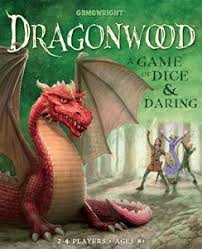Dragonwood Provides a Charming Tabletop Experience

Dragonwood is a card & dice game by Gamewright. I had 17 bucks to spend at my local Barnes and Noble, and I saw it in the ‘Board Games’ section, available for $14.95. I decided to buy it, and I do not regret it.
The way Dragonwood works is there are two decks of cards; the Adventurer deck and the Dragonwood deck. You use Adventurer cards to build combos, which earns you dice. You use dice to attack the creatures in the Dragonwood deck. The game ends when you go through the Adventurer deck twice or when the two dragons in the Dragonwood deck have been defeated. Each Creature card in the Dragonwood deck has a number of victory points and the player with the most victory points when the game ends wins. It is a simple system that most people should have no problem understanding, but it does allow for some strategy. There are different kinds of combos you can build, and Creature cards have different stats for each, so you can try and purposely build up you hand to use an certain kind of attack that a monster is weak against. Not to mention you can build up a combo that lets you use 6 dice, but you can roll all ones.
The art on the actual cards themselves is also really well done; It resembles storybook art, and it really adds to the sort of light mood of playing Dragonwood, which I think is at the core of the game.
Dragonwood is a fun and non-competitive kind of game. You are still trying to win and beat other people, but it doesn’t really feel like an intense game, and even if you lose, you hardly feel sad or mad about it, because the actual game is just so enjoyable.
There are, however, a couple of flaws with Dragonwood. Namely in how exploitable the Enchantment cards can be. Enchantments are cards that can be captured in order to provide a benefit to the player, like letting them reroll 1 die per turn. The thing is, most of them can stay with you for the rest of the game, and you can stack them, adding buff on top of buff, and they provide a huge advantage to the player who gets the right ones quickly enough. So a player can get overpowered if the right cards are pulled from the deck.
Also, the game can get a bit repetitive if you play multiple sessions of it in a row. It’s less noticeable if you play every weekend or every other weekend, but you aren’t gonna be playing a marathon session of Dragonwood for a couple of hours with the boys anytime soon.
Which segways us right into another criticism; the erratic possible lengths of time one can spend playing Dragonwood. The box says the game is for 2-4 players for an average length of about 20 minutes. However, the actual play time can be quite different session to session. When playing with just 2 players, it lasted about 30 minutes. Then with three players I found it to be about the same length, 30 minutes. Then, with a four player game, it just seemed to drag on and on. Granted, we were having bad luck that night, and I kinda lost track of the actual time, but it felt like we had been playing for 40 minutes, even if that wasn’t the actual time we spent playing.
However, Dragonwood remains a good game despite these problems. The problems are there, and you start to notice them after a while, but the game manages to make you not really think about them while you are in the middle of playing.
In conclusion, Dragonwood is a unique and interesting card and dice game that can be held down by some balance issues, game-play that can become repetitive after quite a while, and erratic session times, but is fun for the whole family regardless, so I am giving this game 7 howls out of 10.

My name is Noah Conley, I'm 15, and I'm a reporter and Broadcast Editor for the LC Howler. I've worked on this site my freshman and sophomore years, and...








Crystal Le • Oct 18, 2018 at 10:54 pm
I love board games and this sounds really fun! It is also super affordable compared to some that cost at least $25. (12th grade)